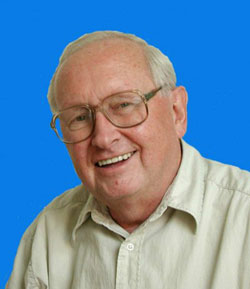 It is with great sadness I have to report the passing of Dr Hasso Niemann, who was a founding father of atmospheric experiments and mass spectrometry at the center which ultimately led to the successful SAM experiment currently operating on the Curiosity Rover. Hasso died peacefully in his sleep early Thursday, July 11 morning after a brief battle with cancer.
It is with great sadness I have to report the passing of Dr Hasso Niemann, who was a founding father of atmospheric experiments and mass spectrometry at the center which ultimately led to the successful SAM experiment currently operating on the Curiosity Rover. Hasso died peacefully in his sleep early Thursday, July 11 morning after a brief battle with cancer.
Hasso leaves a huge legacy at Goddard and in the planetary and atmospheric sciences community with a career devoted to the development of mass spectrometer technology and using these capabilities to measure the composition of planetary atmospheres. Hasso¹s career began in graduated school with rather cumbersome rocket flight experiments and has spanned the epoch that saw spaceflight mass spectrometry evolve from crude, heavy laboratory tools to its current highly sophisticated state where mass spectrometers are now viewed as a primary instrument on planetary missions. Hasso made major contributions at every turn. Early in his career at Goddard as head of the Atmospheric Experiments Branch Hasso pioneered in situ exploration of the upper atmosphere of the earth with instruments on several spacecraft. He later focused on planetary atmospheres with first in situ measurements of the upper atmosphere of Venus on the Pioneer Venus Mission and subsequently the deep atmosphere of Jupiter with the prime instrument on the Galileo Probe that allowed fundamental questions regarding the formation mechanisms of giant planets to be addressed. Hasso contributed greatly to the Cassini mission as Principal Investigator on the Cassini Huygens Gas Chromatograph Mass Spectrometer and the Facility Instrument Provider of the Cassini Ion and Neutral Mass Spectrometer. His legacy continued at Goddard even after his retirement with provision of mass spectrometer by members of his group to missions such as the Mars Science Laboratory and the MAVEN Mars Orbiter.
Hasso cultivated broad and long lasting collaborations with world class planetary atmospheric scientists. He published many ground breaking papers describing the results of these experiments. Among his notable awards were NASA¹s Distinguished Service Medal for his career contributions in mass spectrometry, the Lindsay award in 1997 and the Al Seiff Memorial Award presented to him after his retirement in 2007. After his retirement Hasso continued to participate in the Cassini and continued to advise the mass spectrometer group at Goddard.
Hasso legacy will live on not only with his many planetary science colleagues but also with the technical teams that worked with him on all aspects of instrument development. Hasso’s interest in inviting young people to be part of his instrument efforts, his exemplary leadership and extraordinary work ethic in making the instruments happen, and his graceful and gracious diplomacy in dealing with the myriad people involved in the projects were all lessons in being a model scientist and human being.
The family will conduct private funeral arrangements.
Nicholas White and Jonathan Lunine
